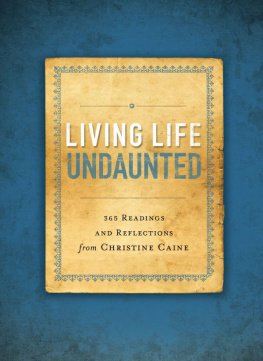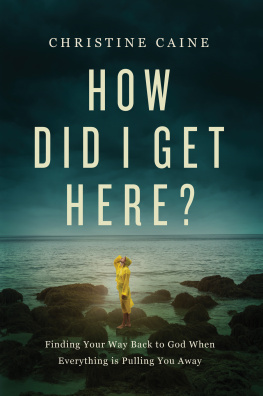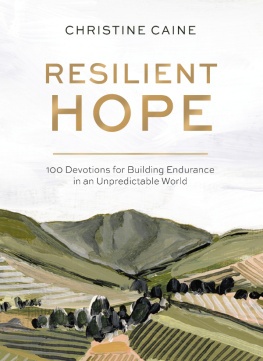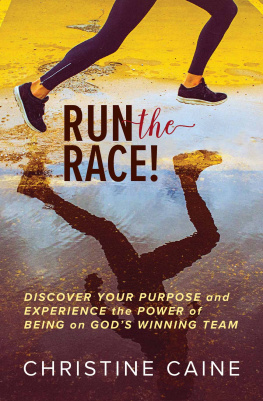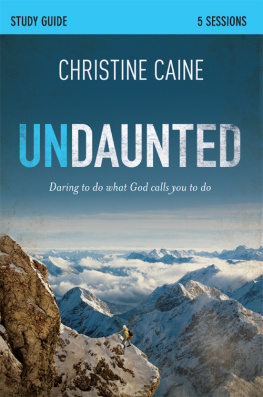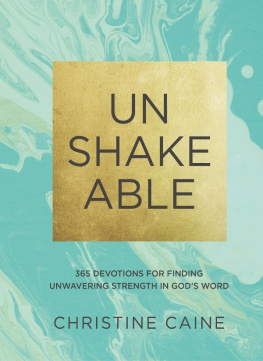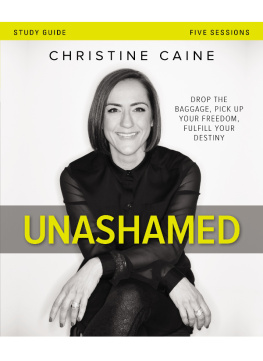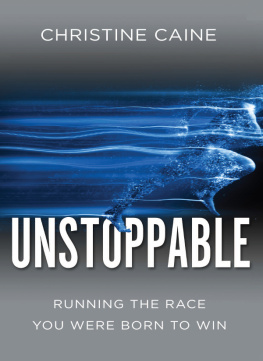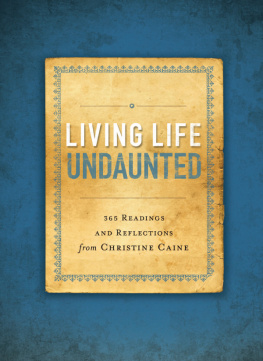CHRISTINE CAINE
UNDAUNTED
Daring to do what God calls you to do

To my husband, Nick,
and precious daughters, Catherine and Sophia.
You are Gods greatest gifts to me.
I am forever grateful.
For we are Gods handiwork, created in Christ Jesus to do good works, which God prepared in advance for us to do.
EPHESIANS 2:10
Contents
I ve wondered what it would be like to visit with the apostle Paul the globe-trotting, gospel-proclaiming, chain-breaking trumpeter of grace.
Ive imagined a good chat with Mary, the mother of Jesus the simple village girl who, upon learning that she would be virgin and pregnant, told God: Whatever you say, Ill do.
Ive envisioned a conversation with Esther the liberator from nowhere. Out of the shadows she stepped, and because she did, a nation was spared.
Paul. Mary. Esther. Turns out, Ive met all three in the person of Christine Caine.
She has the spunk of a Paul. Shes scarcely on the stage, or at the dinner table, before you hear her passions: Jesus, her family, and the forgotten girls of the slave trade. You know where she stands. And you know whom she loves. Its contagious, this heart of hers. Wonderfully infectious.
She has the obedience of a Mary. Who would have pegged a Greek-born, Australia-raised, blonde pistol as a world-changer? Yet, just like the mother of Jesus, she brings Christ to the nations. Everywhere Christine goes, from South Africa to Eastern Europe, she radiates hope.
Especially to the girls to whom she is an Esther the millions of teenage girls who find themselves in the throes of Satans cruelest concoction, the sex trade. These young women should be becoming exactly that, young women. They should be listening to music, reading books, and flirting with guys. Instead, they are locked into brothels, beaten, raped, and treated like livestock.
Their only hope? Jesus Christ. And Jesus has chosen to work through people like Christine. Christ appears, not just in her name, but in her face, resolve, grit, and joy. She makes the rest of us want to love the Jesus she loves in the manner she loves him.
I pray you will read this book. If and when you do, youll discover what I have: God has given our generation a Paul, Mary, and Esther. And her name is Christine Caine.
God has given our generation the opportunity to make a difference in the vilest atrocity of the century.
After reading this book, I resolve to do more.
I hope you will too.
Max Lucado
chapter 1
TheSchindlers ListMoment
T he Greece I found that Wednesday afternoon in March 2010 was not the one I remembered from my honeymoon fourteen years earlier. There were no stunning, whitewashed buildings. No lapis-blue tile rooftops. No festive music. No outdoor market with vendors selling freshly pressed olive oil, mouth-watering feta cheese, fresh cantaloupe.
None of that. This afternoon the streets were empty, black, wet. The normally crystal-blue Mediterranean pounded dark and rough against the Thessaloniki shipping port. Strange how fear, not just the season this long, hard winter changed everything.
Is this how they see it? I wondered.
They were fourteen young women, mostly Eastern European, recently rescued from sex trafficking. But they hadnt begun their journey as women theyd been mere schoolgirls when lured from homes in the Ukraine, Bulgaria, Georgia, Albania, Romania, Russia, Uzbekistan, and Nigeria. Sixteen year olds. Seventeen. Eighteen. Girls who should have been giggling about music and basketball games, worrying about what to wear to school not how to survive the next minute.
Securely hidden in a safe house run by The A21 Campaign, the rescue ministry my husband, Nick, and I had launched just six months before, we were to speak face-to-face this dreary afternoon about a part of Greece Id never known. I kept reminding myself: This is not a movie. This is not reality TV. This is real. This is real.
The young women and I sat together in awkward silence. How does one speak of unspeakable depths of shame and agony?
Nadia braved the waters. Haltingly, she told how she had been raised in a village in Georgia at a time of war and deprivation. Her family possessed an abundance of love but not food. Poverty consumed them. For years Nadia lived on dreams: dreams of escaping the hunger, dreams of a world away from the ravaged village, dreams of becoming a nurse. If she were a nurse, like the ones she saw dress the wounds of soldiers in her village, she could get away. She would travel. She would see a beautiful world, a world in which she had a helpful role to play.
But girls in poor Georgian villages did not go to school beyond the second grade. They needed to learn only how to cook and clean, not to read and write. What man, after all, would want to marry a woman more educated than he? Wasnt that all that was expected to marry, keep house, provide children, depend on ones husband for everything else?
Nadia, an obedient daughter who desperately wanted to please her parents, tried to push aside her secret dream. Yet embers remained in her heart.
So just three weeks before her seventeenth birthday, when a man approached her group of friends at their bus stop and told of opportunities to work in Greece, those embers began to glow brighter. The man told the girls that Greece was beautiful and that people prospered there. He said there were many good-paying jobs for waitresses, hairdressers, shop assistants. He said there were jobs just waiting for nurses.
The man gave her a brochure and said a meeting the following Friday evening would provide all the details.
For the next week, Nadia felt blinded by the light of opportunity. Her dream seemed so possible, so close. On Friday, she arrived early at the village community hall and found a seat in the front row. Several dozen other girls trickled in after her. The room was filled with excitement, chatter. Some men introduced themselves as agents and gave a compelling presentation of the opportunities in Greece. They promised a bright future. They passed out the necessary paperwork for obtaining passports and work visas and patiently helped the girls fill out the forms.
Nadia left the community hall full of hope. She ran home to tell her parents that she had the chance to start a new life. She could not only get education and training as a nurse and live a life of helping others, but she could soon send home money for her entire family.
Her parents were concerned. Greece was so far away. But the embers of hope burned in them too. Perhaps their daughter would be able to get ahead as they never had. Perhaps she could find a profession, earn a good income. She could be their key to new lives too. After much discussion, they reluctantly agreed to let her go. They drained all their accounts, selling what they could, even borrowing, to scrape together the fee Nadia would have to pay the hiring agents for her passage to Greece. Her dream happiness, success, prosperity became their own.
Nadia was met at the airport in Greece by a woman from the hiring agency who spoke no Russian. Nadia spoke no Greek. But despite that confusion, she went with the woman to an apartment building, where she was shown a room that she supposed would be hers. The woman left, and Nadia began to unpack.
Within minutes, her nightmare began. Several men rushed in and locked the door behind them. They beat and raped Nadia repeatedly. She tried to fight back. She screamed for help until she no longer had a voice. But for every protest, every scream, she received more abuse, more torture.




